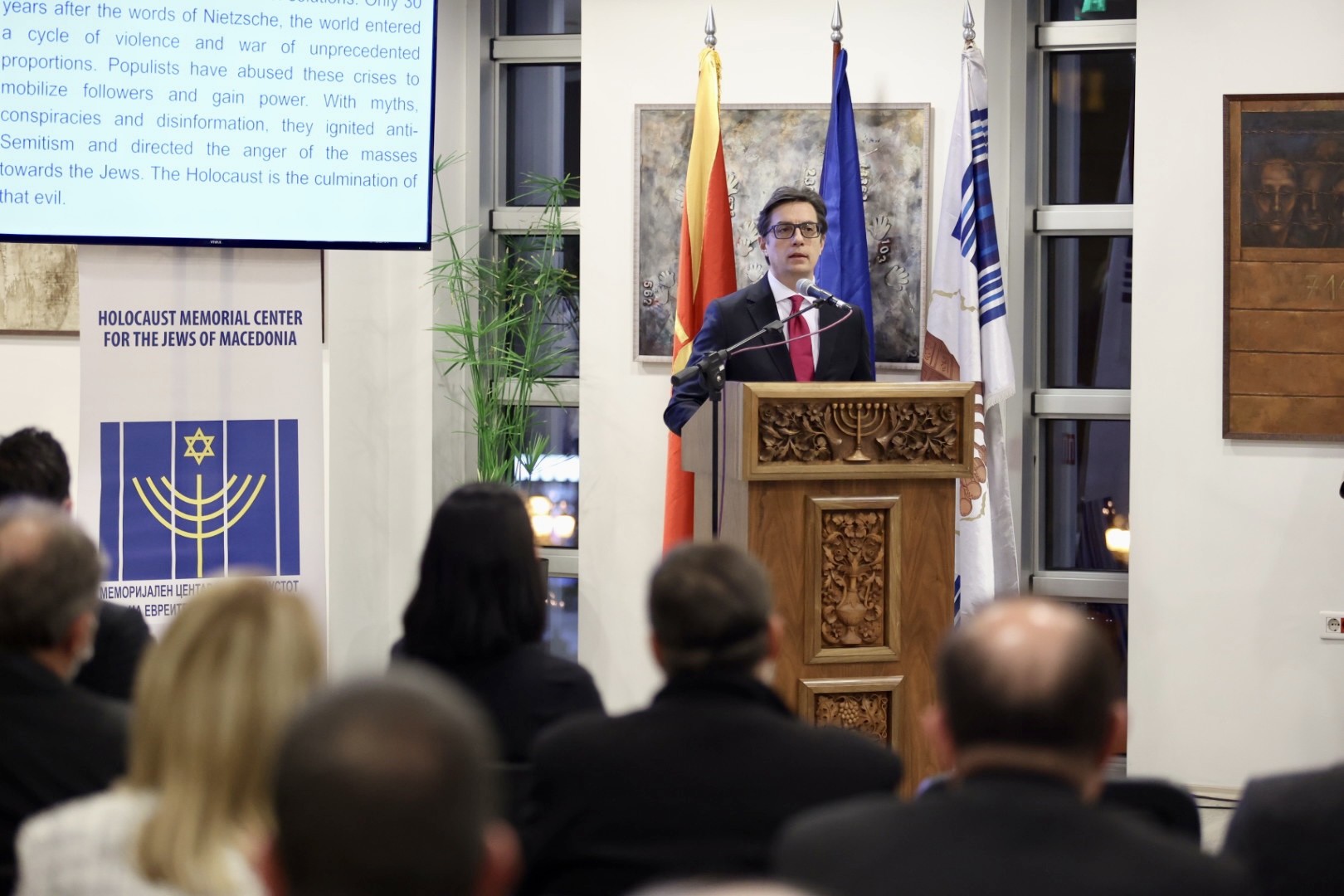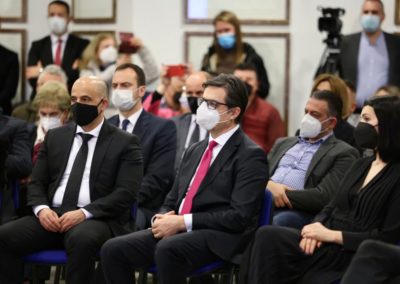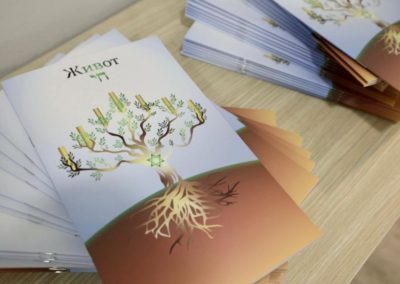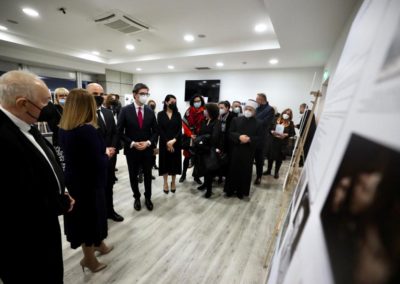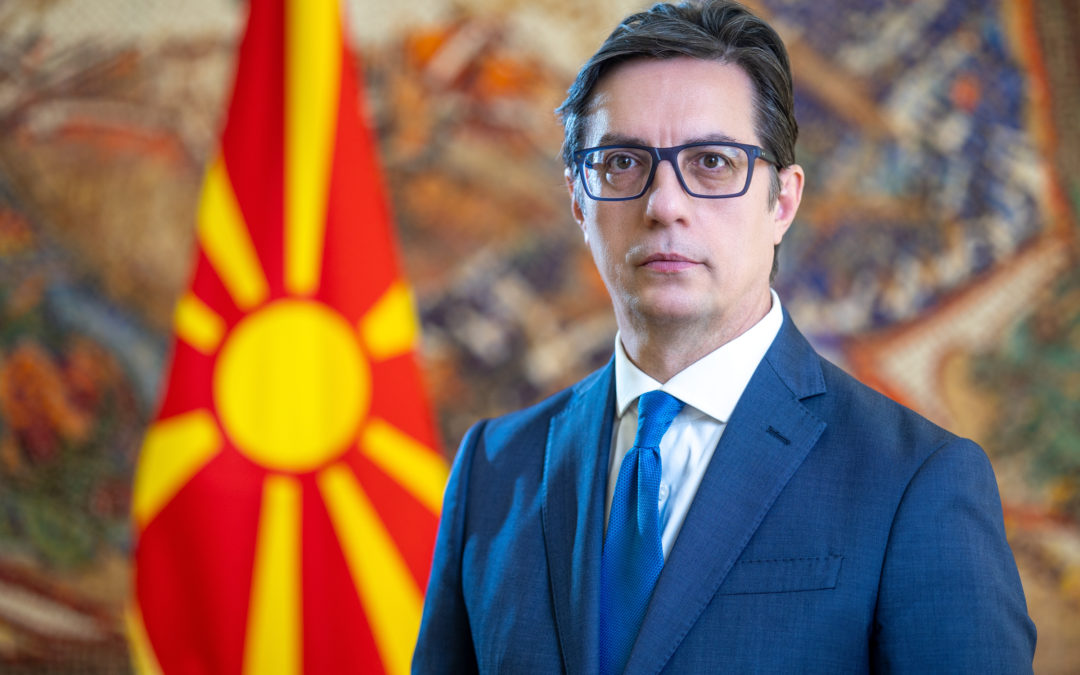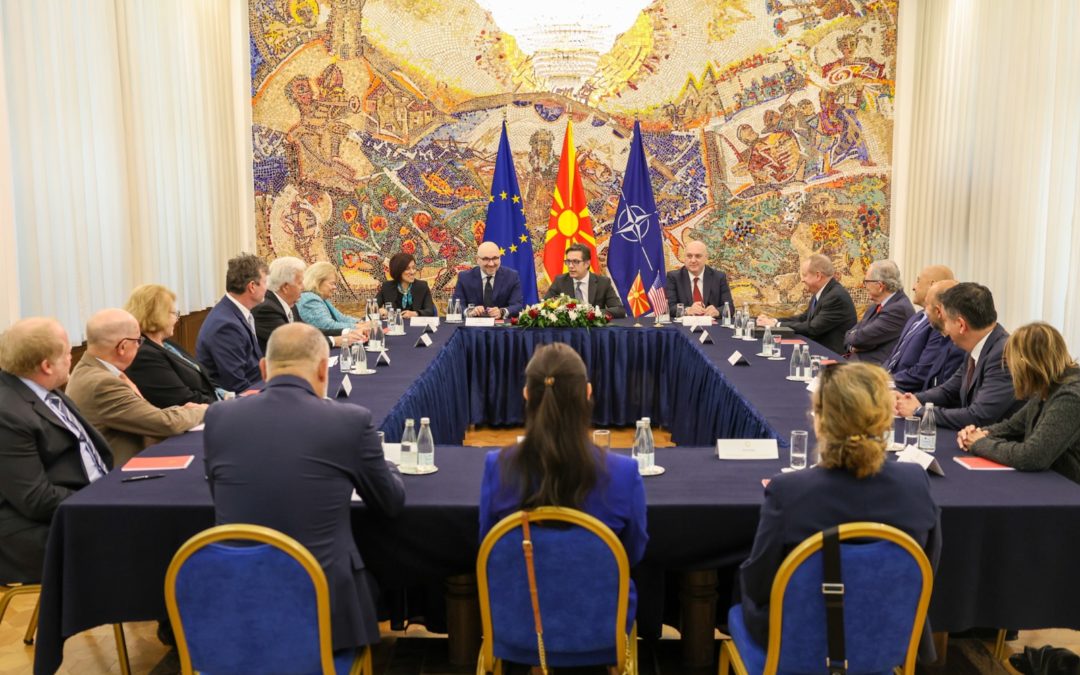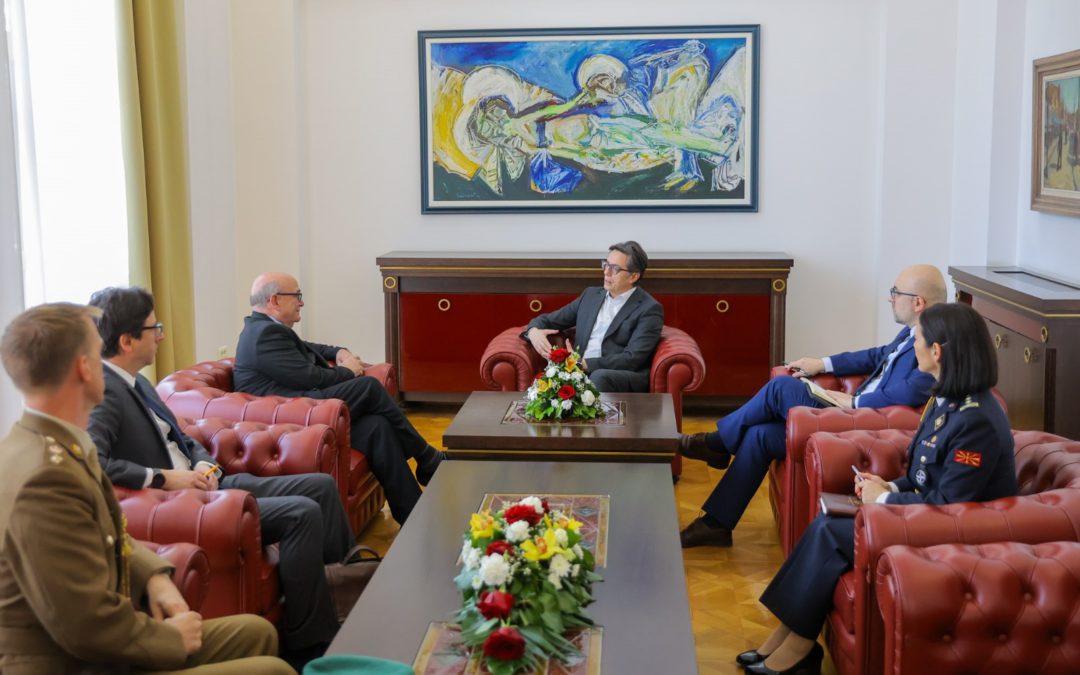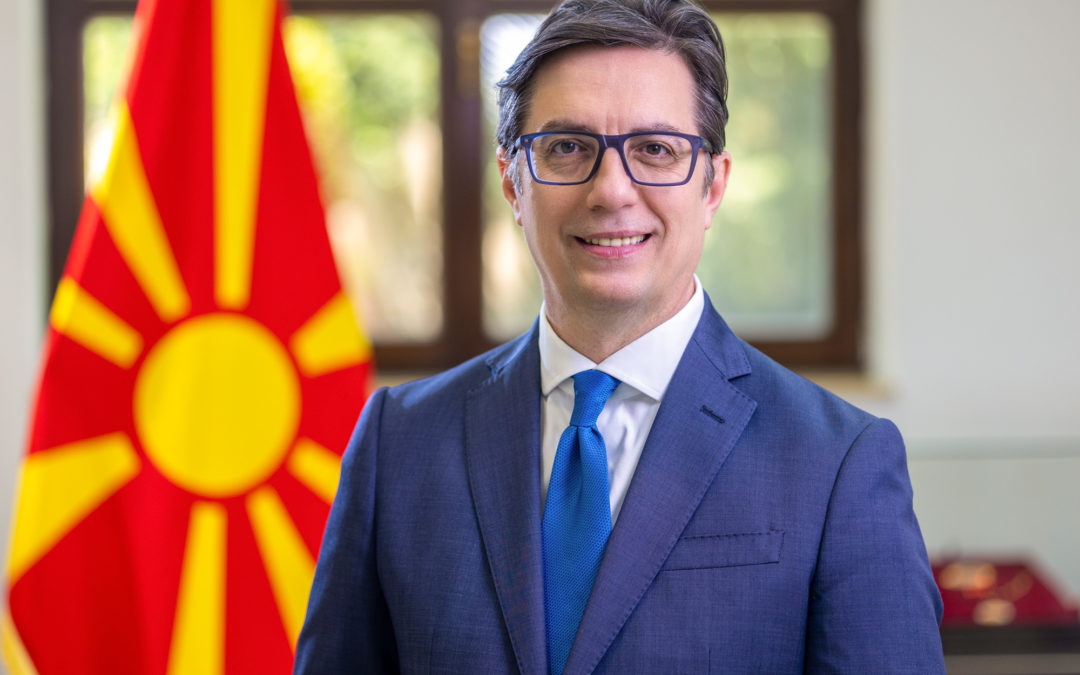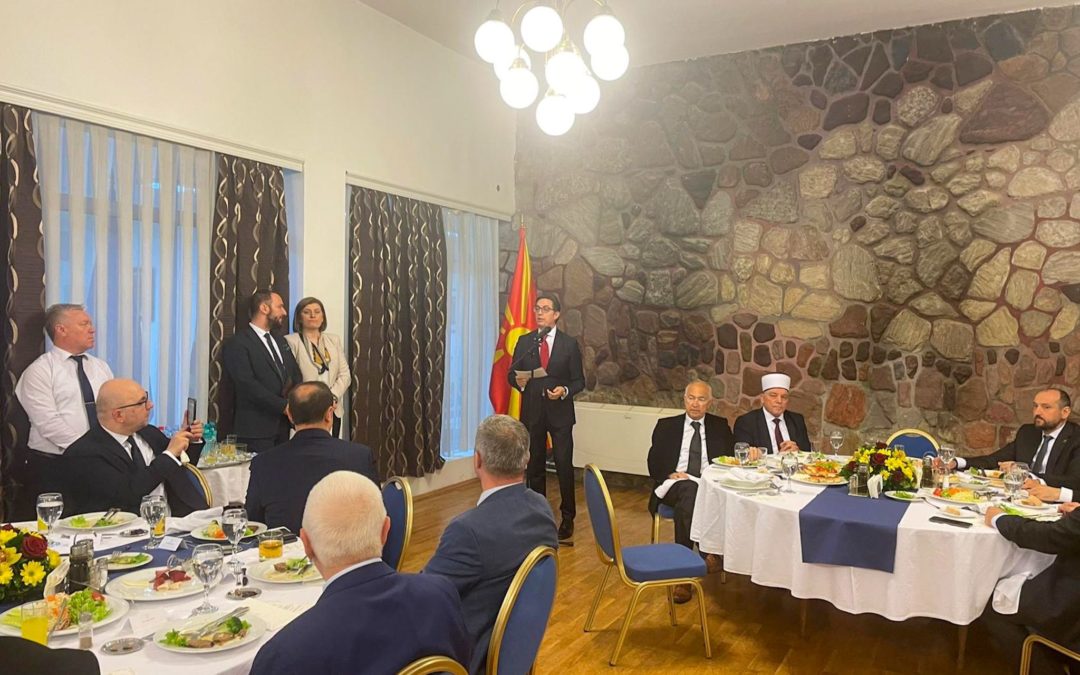President Stevo Pendarovski addressed the commemorative evening on the occasion of the 79th anniversary of the Holocaust of the Macedonian Jews, which was held at the Holocaust Memorial Center of the Jews of Macedonia, organized by the Jewish community and the Holocaust Fund of the Jews of Macedonia.
On the commemorative evening, held as part of the program to mark 11 March 1943, the day when 7,144 Macedonian Jews from Skopje, Bitola and Stip were deported to the Treblinka death camp, President Pendarovski also attended the opening of the exhibition “Life”, dedicated to the surviving Jews who were involved in the reconstruction of the Jewish community and in the construction of the newly created Macedonian state.
In his address, President Pendarovski stressed that history teaches us that in times of crisis and conflict, populists feed people with fear and anger towards the weaker and more vulnerable.
“I am not talking here only about anti-Semitism, but also about all other forms of hatred towards the various that are spreading through social networks and media all over the world. We must oppose any attempt at revisionism and denial of the truth about the Holocaust, but also any form of hatred of those different from us”, the President said.
Distinguished President of the Jewish Community,
Distinguished Director of the Holocaust Memorial Center of the Macedonian Jews,
Distinguished Excellencies, Ladies and Gentlemen,
Tomorrow, March 11, marks the 79th anniversary of the deportation of Macedonian Jews to the Treblinka death camp. Remembering that day of our compatriots, but also of all the victims of the Nazi camps, the question always arises: How was the Holocaust possible, in the age of reason, in the most scientifically and technologically developed continent in the world, among the then most educated generation? Out of the numerous reasons, I would single out three.
First, it is anti-Semitism that has been raging for centuries throughout Europe, where the Jews have repeatedly faced pogroms. Fleeing such persecution, the Sephardic Jews in the 15th century began to seek refuge in the Balkans.
The second is the relativization of moral absolutes. In 1882, the nihilist Friedrich Nietzsche wrote: “God is dead … and we killed him”. He expressed the conviction of his generation that the Enlightenment had eliminated the possibility and necessity of setting a standard of what is “good” that would be objectively true and independent of people.
Third, looking for culprits instead of solutions. Only 30 years after the words of Nietzsche, the world entered a cycle of violence and war of unprecedented proportions. Populists have abused these crises to mobilize followers and gain power. With myths, conspiracies and disinformation, they ignited anti-Semitism and directed the anger of the masses towards the Jews. The Holocaust is the culmination of that evil.
At the Wannsee Conference on 20 January 1942, the Nazis drafted a plan for a “final solution to the Jewish issue”. The plan envisaged extermination of 11 million Jews in Europe. Some of the greatest benefits of that era, such as scientific advances, technical brilliance, and bureaucratic efficiency, were put at the service of the greatest evil.
Driven by an ideology of hatred and contempt for the weak and vulnerable, the Nazis and their allies first systematically deprived the Jews of their civil rights. Through anti-Semitic regulations, they were pushed to the margins of society, and then dehumanized, erasing the humanity and individuality of the victims, turning them into an impersonal mass. The ultimate logical consequence of such a moral vacuum was the death camps. Treblinka was the largest of them. In just 14 months, from August 1942 to September 1943, 925,000 people were killed in Treblinka. Among them were the Macedonian Jews.
Ladies and Gentlemen,
For centuries, the Jews have been an integral part of the Macedonian ethnic, religious, linguistic and cultural mosaic. As respected guilds, doctors, artists and clergymen, they contributed to the development of social, economic and cultural life. The Jews, along with the Macedonian people, shared the aspirations and sacrifices in the struggle for a free state.
It all stopped on 11 March 1943. The statistics are staggering. Of the approximately 24,000 Macedonian victims of World War II, almost one-third was Jews. Specifically, 7,144 men, women and children were forcibly amassed in the Skopje Monopoly and deported to the death camp. They represented 98% of the total Macedonian Jewish community.
Distinguished guests,
It is difficult to imagine, and even more difficult to describe the monstrosity of the Holocaust. Elie Wiesel admits that one of the biggest obstacles to writing his personal testimony about Auschwitz was the language itself. He says that the words hunger, thirst, fear, transport, selection and fire meant something else then. And he concludes that “a handful of ashes weighs more than all the stories for that cursed place”.
Here, in the Holocaust Memorial Center, are the three urns with ashes from Treblinka, in memory of the Jews from Skopje, Bitola and Stip. The ashes speak louder than any of our spoken words. We, the present here, are also surrounded by the works of the Israeli-Macedonian artist Maty Grunberg. He is the last Jewish child to be born just few days before the deportation, and the only survivor from that period. Grunberg describes the evil by painting the Treblinka chimney that swallowed almost all the members of his large family.
The aim of the Nazis and their allies was not only to kill the Jews but also to erase the memory of their existence. Therefore, we must remember the victims of the Holocaust and not forget that each of those 7,144 Jews is a man with a name and a surname, with an innate and inalienable human dignity.
But, we must also remember because of something else. History teaches us that in times of crisis and conflict, populists feed people with fear and anger towards the weaker and more vulnerable. I am not talking here only about anti-Semitism, but also about all other forms of hatred towards the various that are spreading through social networks and media all over the world. We must oppose any attempt at revisionism and denial of the truth about the Holocaust, but also any form of hatred towards those different from us.
To that end, at the recently held international forum on the Holocaust in Malmo, North Macedonia pledged to include content in its primary education curriculum that would address anti-Semitism and Holocaust denial. As a country, we are obliged to organize mandatory visits to this Memorial Center for all primary and secondary school students.
Is there a hope after the Holocaust?
Ladies and Gentlemen, I am convinced that there is. A reason for hope is the righteous among the nations, who risked their lives to save the Jews. Among the 14,000 righteous registered in Yad Vashem is Stojan-Bogoja Siljanovski, a one-legged invalid who had a shop in the center of Bitola, just opposite the police station, who hid eight Jewish women during the deportation.
The second reason for hope is the survivors. Jews who survived the Holocaust became a vital part of the anti-fascist struggle. Among the eight Jewish women saved by Bogoja were the future partisans Estreja Ovadia-Mara, Jamila Kolomonos-Cveta, Estreja Levy-Lena, Rosa Kamhi Russo and Adela Faraji-Kata.
After the war, part of the 300 surviving Jews left because they could not live in the empty Jewish neighborhoods, without their loved ones, without having anyone to speak to in Ladino or Yiddish. Many of them settled in Israel and became a bridge of friendship between our two countries. But the remaining Jews became involved in the rebuilding of the Jewish community and in the building of the newly created Macedonian state. The exhibition “Life” is dedicated to them. These are the people thanks to whom there is an active Jewish community today.
Dear Friends,
Not long ago, on Hanukkah, I pointed out that we are especially proud of our fellow citizens Jews, because they remind us all of the ultimate victory of life over destruction, and the memory of oblivion.
Therefore, we choose to remember, so as not to repeat it.
Thank you.
